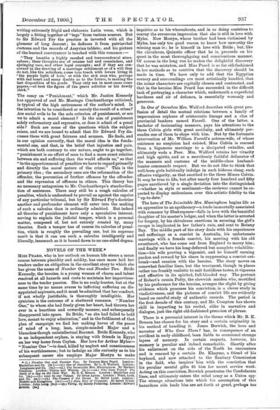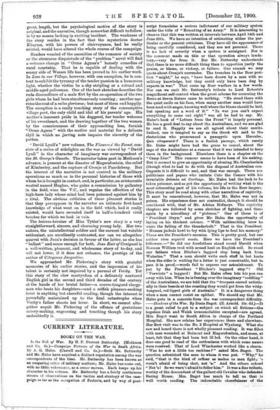NOVELS OF THE WEEK.* Miss PEARD, who in her outlook
on human life steers a mean course between placidity and acidity, has once more laid her readers under an obligation in the excellent story to which she has given the name of Number One and Number Two. Bride Kennedy, the heroine, is a young woman of charm and talent resolved at all hazards and costs to maintain her impervious- ness to the tender passion. She is no scalp-hunter, but at the same time by no means averse to inflicting suffering on dis- appointed aspirants, and it must be admitted that her conduct, if not wholly justifiable, is thoroughly intelligible. Her cynicism is the outcome of a shattered romance. " Number One," to whom she had freely given her heart, had thrown her over in a heartless and cowardly manner, and subsequently disappeared into space. So Bride, "as she had failed to hold love, meant to enjoy admiration," and in the fulfilment of that plan of campaign we find her mating havoc of the peace of mind of a long, lean, simple-minded Major and a blameless though unintellectual Baronet. Bride Kennedy, who is an independent orphan, is staying with friends in Egypt on her way home from Ceylon. Her love for Arthur Myles— "Number One "—is dead, killed by neglect and consciousness of his worthlessness; but to indulge an idle curiosity as to his subsequent career she employs Major Mostyn to make
• (L) Number One and Number Two. By Frances Mary Peard. London : Macmillan and Co. [6s.]—(2.) One of Ourselves. By L. B. Walford. London : Longmans and co. [es.]—(3.) The Inimitable Mrs. Massingham. By Herbert Compton. London : Chat° and Windt's. [Cs.]—(4.) Who Goes There? The Story of a Spy in the Civil War. By B. K. Benson. London : Macmillan and Co. [6s.)---(5.) Love in our Village. By Orme Agnus. London : Ward, Lock, and Co. [Ss.]-01.1 The Flowers o' the Forest. By David Lyall. London : Hodder and Stoughton. [Gs.]—(7.) Jean Keir of Craig:nett- By Sarah Tytler. London : John Long. [6s.]—(8.) Verity. By Sidney Pickering. London : edward Arnold. [Bea inquiries as to his whereabouts, and in so doing contrives to convey the erroneous impression that she is still in love with Myles. Now Mostyn, whose brother had been victimised by Myles, has only too good reason to know how unworthy the missing man is ; he is himself in love with Bride ; but, like the chivalrous, Quixotic officer that he is, proceeds on his quest in the most thoroughgoing and conscientious manner. Of course in the long run he makes the delightful discovery that he was mistaken, and Miss Peard is so far old-fashioned in her methods as to contrive that the discovery should be made in time. We have only to add that the Egyptian scenery and surroundings are most artistically handled, that the minor characters are capitally chosen and contrasted, and that in the heroine Miss Peard has succeeded in the difficult task of portraying a character which, underneath a superficial hardness and air of defiance, is essentially womanly and generous.
In One of Ourselves Mrs. Walford describes with great pro- fusion of detail the mutual relations between a family of impecunious orphans of aristocratic lineage and a clan of provincial bankers named Farrell. One of the latter, a bachelor of insinuating manners, pays his attentions to the three Colvin girls with great assiduity, and ultimately per- suades one of them to elope with him. But by the fortunate intervention of Mr. William Farrell's actress-wife, of whose existence no suspicion had existed, Miss Colvin is rescued from a bigamous marriage to a dissipated swindler, and ultimately weds a Peer. Mrs. Walford retains her vivacity and high spirits, and as a mercilessly faithful delineator of the manners and customs of the middle-class husband- hunter commands respect. But we do not like to think that well-born girls habitually indulge in such hideous slang, such effusive vulgarity, as that ascribed to the three Misses Colvin. It may be true to life, but after nearly four hundred and fifty pages unrelieved by a single deviation into the distinguished —whether in style or sentiment—the reviewer cannot be ex- pected to display enthusiasm over this artistic fidelity to the " up-to-date."
The hero of The Inimitable Mrs. Massingham begins life as an apprentice to an apothecary—a trade immortally associated with romance by Shakespeare—falls in love with the beautiful daughter of his master's lodger, and when the latter is arrested for forgery, by his chivalrous exertions in securing the girl's escape is implicated in her father's ruin, and sent to Botany Bay. The middle part of the story deals with his experiences and sufferings as a convict in Australia, his unfortunate marriage with a female convict, his meeting with his old sweetheart, who has come out from England to marry him ; and finally we have his long-deferred but complete rehabilita- tion—his wife proving a bigamist, and he himself earning pardon and reward by his share in suppressing a convict out- break—and reunion with the heroine. The story moves on somewhat familiar lines, but the treatment, though in places rather too frankly realistic to suit fastidious tastes, is vigorous and effective in its spirited, full-blooded way. The portrait of Robert's cousin Patty, the shrewish maiden who, mortified by his preference for the heroine, avenges the slight by giving evidence which procures his conviction, is a clever study in vindictiveness, and the pictures of convict life are evidently based on careful study of authentic records. The period is the first decade of this century, and Mr. Compton has shown skill in imparting to his recital, alike in narrative and dialogue, just the right old-fashioned precision of phrase.
There is a perennial interest in the theme which Mr. B. K. Benson has chosen for his story and a certain originality in his method of handling it. Jones Berwick, the hero and narrator of Who Goes There? has, in consequence of an accident in early childhood, been liable to occasional strange lapses of memory. In certain respects, however, his memory is peculiar and indeed remarkable. Shortly after his enlistment on the side of the North he encounters and is rescued by a certain Dr. Khayme, a friend of his boyhood, and now attached to the Sanitary Commission in the field, who inspires 'him with the conviction that his peculiar mental gifts fit him for secret service work. Acting on this conviction, Berwick penetrates the Confederate lines, and ultimately enters the rebel army as a Union spy. The strange situations into which his assumption of this hazardous role leads him are set forth at great, perhaps too
great, length, but the psychological motive of the story is original, and the narrative, though somewhat difficult to follow, is by no means lacking in exciting incident. The weakness of the story resides in the fact that the mysterious doctor Khayme, with his powers of clairvoyance, had he really existed, would have altered the whole course of the campaign.
Readers wearied of the amenities of the romance of society or the strenuous disquietude of the " problem " novel will find a welcome change in " Orme Agnus's " homely comedies of rural courtship. That he is capable of dealing with the seamy side of Wessex life has been proved in his earlier work. In Love in our Village, however, with one exception, he is con- tent to exhibit the tyranny of the tender passion in a humorous light, whether the victim be a shy stripling or a rotund and middle-aged policeman. One of the best sketches describes the rude discomfiture of a male flirt by the co-operation of the two girls whom he had been simultaneously courting ; another nar- rates the rout of a miles gloriosus; but most of them end happily. The exception is a really touching story of the consumptive village poet, the only child and idol of his parents' age. His mother's innocent pride in his doggerel, her tender welcome of his sweetheart, and the drawing together of the two women by the consciousness of their approaching loss, furnish " Orme Agnus " with the motive and material for a delicate idyll in which no jarring note impairs the sincerity of the pathos.
" David Lyall's " new volume, The Flowers o' the Forest, con- sists of a series of sidelights on the war as viewed by "David Lyall " in the character of imaginary war correspondent of the St. George's Gazette. The narrator takes part in Methuen's advance, is present at the disaster of Magersfontein, the relief of Kimberley, and the capture of Cronje at Paardeberg. But the interest of the narrative is not centred in the military operations so much as in the personal histories of those with whom he is brought in contact, and, in particular, an aristocratic wastrel named Hughes, who gains a commission by gallantry in the field, wins the V.C., and regains the affection of the high-born lady whose mind had been poisoned against him by a rival. The obvious criticism of these pleasant stories is that they presuppose in the narrator an intimate first-hand knowledge of what went on in the field which, had it really existed, would have revealed itself in half-a-hundred vivid touches for which we look in vain.
The heiress-heroine of Miss Tytler's new story is a very straightforward, sincere, and charming young lady. Her two suitors, the unintellectual soldier and the earnest but voluble enthusiast, are excellently contrasted, nor can we altogether quarrel with Jean's decision in favour of the latter, as she has " ballast " and sense enough for both. Jean Keir of Craigneil is a well-written, pleasant, and wholesome story of to-day, and will not lower, if it does not enhance, the prestige of the author of Citcryenne Jacqueline.
We approached Mr. Pickering's story with grateful memories of his earlier stories, and the impression of his talent is certainly not impaired by a perusal of Verity. Yet this story of the slow martyrdom of a delicately nurtured English girl in the second and third decades of the century at the hands of her brutal father—a coarse-tongued clergy- man who beats his daughters—and a selfish pleasure-seeking lover is anything but cheerful reading, though the interest is powerfully maintained up to the final catastrophe when Verity's father shoots her lover. In short, we cannot alto- gether acquit Mr. Pickering of the offence of gratuitous misery-making, engrossing and touching though his story undoubtedly is.







































 Previous page
Previous page